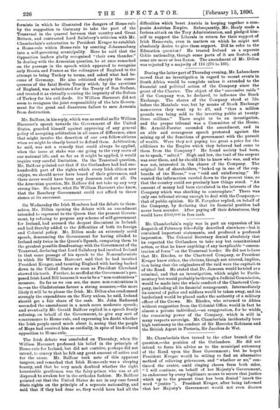Mr. Chamberlain's reply was in part an expansion of his
despatch of February 4th—fully described elsewhere—but it contained important statements, and produced a profound impression. The Colonial Secretary denied absolutely that he expected the Outlanders to take any but constitutional action, or that he knew anything of any inexplicable " concen- tration of force" on the Transvaal border. He did not believe that Mr. Rhodes, or the Chartered Company, or President Kruger knew either, the obvious, though not uttered, implica- tion being that the originators of the raid were the capitalists of the Rand. He stated that Dr. Jameson would be tried as a criminal, and that an investigation, which might be Parlia- mentary but would probably be thron gh a Judicial Commission, would be made into the whole conduct of the Chartered Com- pany, including all its financial management. Intermediately its control of police and soldiers would be taken away, and its borderland would be placed under the authority of a military officer of the Crown. Mr. Rhodes, who returned to Africa without suggestion from the Colonial Office, would in fact be almost a private individual,—an exaggeration, for he wields. the remaining power of the Company, which is still in many respects sovereign. Mr. Chamberlain incidentally bore high testimony to the conduct of Sir Hercules Robinson and the British Agent in Pretoria, Sir Jacobus de Wet.


































 Previous page
Previous page